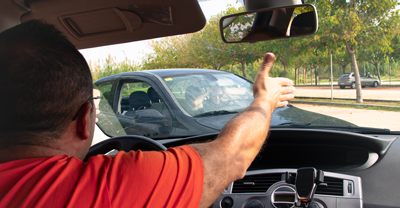Distracted driving prevention tips for new drivers


0 min. read
Earning your driver's license is a milestone that comes with a vital responsibility: prioritizing safe driving habits.
As a new driver, understanding the seriousness of distractions while driving is the ultimate test. Even a split-second loss in focus can lead to severe consequences, including injuries, property damage, and fatalities. Distracted driving is a problem for all ages—but it's especially concerning for new drivers. According to the National Highway Traffic Safety Administration (NHTSA), 7% of fatal crashes in 2020 involved distracted drivers aged 15 to 20.*
This guide provides details and strategies to help you stay focused on the road.
Is texting the only danger?
Distracted driving extends far beyond texting or chatting on the phone—though doing so behind the wheel is like hurtling down the highway blindfolded. It encompasses any activity that diverts your attention from the road, whether it's adjusting the radio, grabbing a quick bite, or simply drifting off in thought. Our brain's ability to focus is limited, and attempting to multitask while driving is a recipe for danger.
While texting and driving may grab the spotlight as a top distraction—diverting your attention from critical tasks like steering—any activity that draws your eyes, hands, or mind away from the road presents a significant risk. Here are the three primary types of driving distractions:
Visual distractions: These momentarily take your eyes off the road. Examples include glancing at your phone, adjusting the radio, or looking at a passenger.
Manual distractions: These involve taking your hands off the wheel, affecting your control over the vehicle. Activities like handling food wrappers, adjusting music, or retrieving dropped items fall into this category.
Cognitive distractions: Even if your eyes and hands are in position, cognitive distractions divert your mind from driving. Engaging in deep conversations with passengers, daydreaming, or feeling stressed can be cognitive distractions.
To gain a deeper understanding of the real-life consequences of distracted driving, watch this powerful video about the Goeltz family, who lost their daughter to a distracted driver.

Learn more. Request a free auto insurance quote today.
Distracted driving risks for new drivers
As a new driver, you face unique distractions. Learning to drive involves not only handling the mechanics of operating a vehicle but also staying aware of what’s happening around you. Your risks vary from those of a driver who’s had years on the road. Here are a few examples to put this into perspective:
Inherent distractions: Just driving itself can be distracting. Adapting to traffic flow, understanding road signs, and navigating unfamiliar routes demand mental focus.
Reaction time: New drivers might not react as quickly to unexpected events on the road. Lack of experience can lead to delayed responses, especially during critical moments.
Navigational challenges: Figuring out new roads, deciphering traffic patterns, and understanding complex intersections can divert your attention away from driving.
Stay focused: Five habits for safe driving
Safe driving is about more than just avoiding mistakes—it requires actively practicing positive habits that benefit everyone on the road. Here are five key actions you can practice to help enhance your focus and minimize distractions:
Reduce reliance on your phone

Your smartphone becomes a major risk when you get behind the wheel. Even seemingly harmless hands-free calls can divert your attention, especially during tricky discussions. According to the NHTSA, dialing a phone number while driving increases crash risk sixfold, and texting multiplies it by 23!* Use an app that blocks activity while driving or toss your phone in the glove box. If you must chat, pull over to a safe spot first.
Streamline in-car activities

Good planning before you drive can help you keep multitasking to a minimum. Set your navigation system and choose your favorite tunes before hitting the road. Also avoid using your drive time for sipping coffee, ordering takeout, munching on meals, or fixing your appearance in the rear-view mirror.
Limit passengers

NHTSA research shows having passengers in the car can significantly impact safety. Driving with a single passenger makes distractions two-and-a-half times more likely. Conversations, music, and other interactions can divert your attention from the road. If you have multiple passengers in the car, the distraction factor triples. Loud conversations, laughter, and disruptions can compromise your ability to drive safely.
Maintain situational awareness

Staying focused on the road and being aware of your surroundings is crucial. Actively watch other drivers and anticipate their moves. Avoid tunes that distract you from the road. A soothing playlist can enhance your drive without compromising safety. On long trips, take breaks, as fatigue can sneak up on you and affect your concentration.
Take advantage of technology

Turn on all the safety features newer cars offer, like lane departure warnings, blind-spot detection, interactive cruise control, and automatic emergency braking. These features are like having an extra set of eyes on the road. But remember, the most sophisticated tool for safe driving will always be your own concentration.

Request a free auto insurance quote from Dairyland.
Know your state’s distracted driving laws
Distracted driving poses a serious risk for all drivers, especially new ones. While no state completely prohibits cellphone use while driving, many have implemented specific laws to combat this dangerous behavior. Here are some key points to consider from the Governor’s Highway Safety Association (GHSA):
Handheld cellphone use:
34 states have banned drivers from using handheld cellphones while driving.
This means you can’t hold your phone and talk or text while behind the wheel.
These laws are strict and can result in a ticket, even without any other traffic violations.
Novice drivers:
36 states have gone a step further by banning all cellphone use for novice drivers.
Novice drivers, often younger and less experienced, benefit from these laws, as they promote focused attention on driving safely.
Text messaging:
49 states have banned text messaging for all drivers.
Texting while driving diverts attention from the road, making it extremely dangerous.
Most states enforce this law strictly, meaning you can get a ticket just for texting.
Along with driving laws, car insurance requirements also vary by state.
Embrace safe driving for life
Getting behind the wheel is a privilege that comes with a responsibility to follow rules and drive safely. As a new driver, you’re beginning a life of experiences on the road—both positive and challenging. Dairyland®, a brand of the Sentry Insurance Group, is here to protect you on your journey. We offer more than just car insurance coverages. We provide resources and practical tips to empower you on the road. So, buckle up, stay focused, and embrace safe driving as a lifelong commitment.
The general information in this blog is for informational or entertainment purposes only. View our blog disclaimer.
*Data accuracy is subject to this article's publication date.










